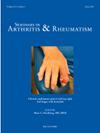Effectiveness and safety of anti-CD20 monoclonal antibodies versus csDMARDs in anti-Jo-1 antisynthetase syndrome: A retrospective cohort study
IF 4.6
2区 医学
Q1 RHEUMATOLOGY
引用次数: 0
Abstract
Objectives
Anti-Jo-1 antisynthetase syndrome (Jo1+ASyS) is the most common form of idiopathic inflammatory myopathy with high relapse rates and limited treatment options beyond csDMARDs, which frequently fail to achieve adequate disease control. This study aimed to evaluate the efficacy and safety of anti-CD20 monoclonal antibodies (CD20mAbs) compared to conventional synthetic(cs) DMARDs in patients with Jo1+ASyS.
Methods
A single-center retrospective cohort of patients with Jo1+ASyS were collected at RenJi Hospital in China (2007–2023). A prevalent new-user design with time-based propensity scores, applied without replacement, was used to match CD20mAb and csDMARD users. The primary outcome was the percentage of patients reaching Low Disease Activity (5-item LDA), as defined by the absence of active arthritis, myositis, ILD, fever, and prednisone dosage ≤7.5 mg/day.
Results
A total of 166 eligible treatment regimens, including CD20mAbs and csDMARDs, were extracted from 128 Jo1+ASyS patients with a median follow-up period of 5 years. Utilizing propensity score, 49 pairs of individual prescriptions for CD20mAbs and csDMARDs users were matched. The group treated with CD20mAbs exhibited a significantly higher rate of achieving LDA compared to those treated with csDMARDs (46.9 % vs. 22.4 %, p = 0.011). No significant differences in exposure-adjusted incidence rate were detected between the two treatment modalities (CD20mAbs vs. csDMARDs = 7.911 vs. 6.479 per 100 patient-yr, RR = 1.22; 95 % CI: 0.64, 2.36), with respect to major infections. Sensitivity analyses further confirmed the robustness of the superior effectiveness of the CD20mAbs compared to the csDMARDs.
Conclusion
CD20mAbs exhibited remarkable treatment efficacy and acceptable safety in patients with Jo1+ASyS. Cumulative evidence, including ours suggested that CD20mAbs should be considered as a first-line option for Jo1+ASyS.
抗cd20单克隆抗体对抗抗jo -1抗合成酶综合征csDMARDs的有效性和安全性:一项回顾性队列研究
抗jo -1抗合成酶综合征(Jo1+ASyS)是最常见的特发性炎性肌病,复发率高,除csDMARDs外治疗选择有限,往往无法实现充分的疾病控制。本研究旨在评估抗cd20单克隆抗体(cd20mab)与常规合成(cs) dmard在Jo1+ASyS患者中的疗效和安全性。方法收集中国仁济医院2007-2023年Jo1+ASyS患者的单中心回顾性队列研究。一种流行的新用户设计,具有基于时间的倾向评分,无需替换,用于匹配CD20mAb和csDMARD用户。主要终点是达到低疾病活动性(5项LDA)的患者百分比,定义为无活动性关节炎、肌炎、ILD、发烧和强的松剂量≤7.5 mg/天。结果从128例Jo1+ASyS患者中共提取了166个符合条件的治疗方案,包括cd20mab和csdmard,中位随访时间为5年。利用倾向评分,将49对cd20mab和csDMARDs使用者的个体处方进行匹配。与csDMARDs治疗组相比,cd20mab治疗组的LDA达到率显著更高(46.9% vs 22.4%, p = 0.011)。两种治疗方式的暴露调整发生率无显著差异(CD20mAbs vs. csDMARDs = 7.911 vs. 6.479 / 100患者-年,RR = 1.22;95% CI: 0.64, 2.36)。敏感性分析进一步证实了cd20mab与csdmard相比具有更强的有效性。结论cd20mab对Jo1+ASyS患者具有显著的治疗效果和可接受的安全性。包括我们在内的累积证据表明,cd20mab应被视为治疗Jo1+ASyS的一线选择。
本文章由计算机程序翻译,如有差异,请以英文原文为准。
求助全文
约1分钟内获得全文
求助全文
来源期刊
CiteScore
9.20
自引率
4.00%
发文量
176
审稿时长
46 days
期刊介绍:
Seminars in Arthritis and Rheumatism provides access to the highest-quality clinical, therapeutic and translational research about arthritis, rheumatology and musculoskeletal disorders that affect the joints and connective tissue. Each bimonthly issue includes articles giving you the latest diagnostic criteria, consensus statements, systematic reviews and meta-analyses as well as clinical and translational research studies. Read this journal for the latest groundbreaking research and to gain insights from scientists and clinicians on the management and treatment of musculoskeletal and autoimmune rheumatologic diseases. The journal is of interest to rheumatologists, orthopedic surgeons, internal medicine physicians, immunologists and specialists in bone and mineral metabolism.

 求助内容:
求助内容: 应助结果提醒方式:
应助结果提醒方式:


